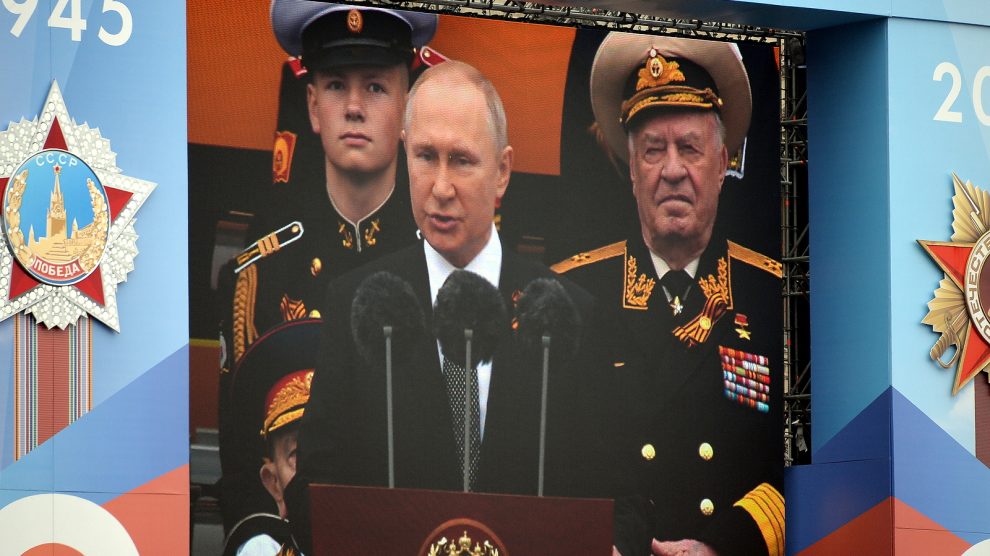By remembering and studying the history of the USSR, we can pay tribute to its victims, and prevent its reconstruction.
Although I was born in independent Ukraine, I still feel the influence of the USSR – on myself and my family.
Why does this happen? After all, I was born and have been living in independent Ukraine for almost thirty years.
The answer is that the USSR is a prison for everyone who was a citizen. My parents spent thirty years in this prison, and as such the influence of those years was reflected not only on them, but also on me.
- The sports community should not reward Russia
- Why, during wartime, Ukraine’s EU integration is more important than ever
- Decentralisation is NAFO’s greatest strength
This prison had only two doors. Entering one you become a part of a large system, a “new class” (in the understanding of Yugoslav communist Milovan Djilas), entering the other you are subject to repression to a greater or lesser extent.
The USSR was a time not only of the destruction of various intellectual elites, but also of the creation of a “bureaucrat” elite, which replaced all others.
All those who did not want to join the “new class”, that is, the class of bureaucrats, were not subject to repression, but became to a certain extent slaves of this chosen caste. These people were forced, on the one hand, to serve the “higher caste”, and on the other hand, this complex of “inferiority” was embedded in their mentality, when you always need to save on everything, when you cannot afford a vacation, when you are afraid to say something on the phone, because it is wiretapped by the KGB. In the end, you lose dignity and freedom, as the highest and universal human value.
All this can be interpreted as the mental genocide of a person during the time of the USSR. But along with this mental genocide, Ukrainians also experienced physical genocide (Holodomor), caused by Stalin in 1932-33.
The events of those years showed the world two things. Firstly, that Stalin and the leadership of the USSR feared and hated Ukrainians as a nation, and tried to destroy them as an ethnic group, and secondly, the indomitability of the Ukrainian nation, because despite the Holodomor, Ukrainians survived and revived for further struggle against the post-Stalinist regime.
The post-Stalin period is the fear of the return of repression, the feeling of lack of freedom, the same mental genocide mentioned above.
A person who, not being included in the “new class of bureaucrats”, was practically doomed to the mental destruction of himself and his family. People could be less afraid of physical repression, but they were replaced by, say, psychological torture, when people who were “unacceptable” to the system were made insane and locked up in psychiatric hospitals. It is also worth adding economic genocide here, because if you were not a party official, there was no economic freedom.
Russia is not Europe
The collapse of the USSR was liberation from the physical yoke, but mental wounds remain to this day. For Ukrainians, it was nevertheless a victory against an enemy with whom the struggle has lasted for centuries – and continues to this day.
This struggle was not equal, because the West has always perceived Russia (in its various forms – the Russian Empire, the USSR, the Russian Federation) as a part of Europe from the time of Peter I.
As for Ukraine, there was never any unambiguity. After the collapse of the USSR, Russia began to prepare for war with Ukraine. This preparation manifested itself in various forms: from the complete disarmament of Ukraine to energy blackmail and even territorial provocations (such as the 2003 Tuzla Island conflict).
Russia’s full-scale invasion of Ukraine in February 2022 was the beginning of a new round of this centuries-old war. war for the survival and existence of Ukraine. Ukrainians have no other choice but to win this round and pass the winning baton to the next generation for a new struggle.
Today, for the first time in history, the collective West is on the side of Ukraine. Ukraine became a subject of geopolitics for the first time. The collective West’s understanding of Russia’s goals allows us to say that for the first time since of Peter I, Russia can remain outside the borders of Europe, both in the geopolitical and geographical aspects. Russia has already become as toxic as possible for anyone in the West, especially politicians. Any political contact with Russia will cost any European politician their political reputation, and possibly even their political end.

Territorial concessions to Putin are a license to reconstruct the USSR
Putin and Putin’s Russia are a mix, a hybrid of communist dictatorship, terrorism and banditry.
On September 30, 2022, announcing the annexation of the occupied Ukrainian territories, he confirmed that his goal is to restore the borders of the USSR. Allowing him to bring any Ukrainian territory under his control would mean granting permission for the reconstruction of the USSR.
It would also be permission to return to the mental and physical genocide that Ukrainians experienced during the days of communism and the USSR. This is a return to constant fear, impunity, lack of justice.
The highest value is freedom. Freedom does not come for free. When we think about whether it is worth supplying Ukraine with tanks and military aircraft, remember that Ukrainians are paying for freedom with their lives.
Unlike many news and information platforms, Emerging Europe is free to read, and always will be. There is no paywall here. We are independent, not affiliated with nor representing any political party or business organisation. We want the very best for emerging Europe, nothing more, nothing less. Your support will help us continue to spread the word about this amazing region.
You can contribute here. Thank you.







Add Comment